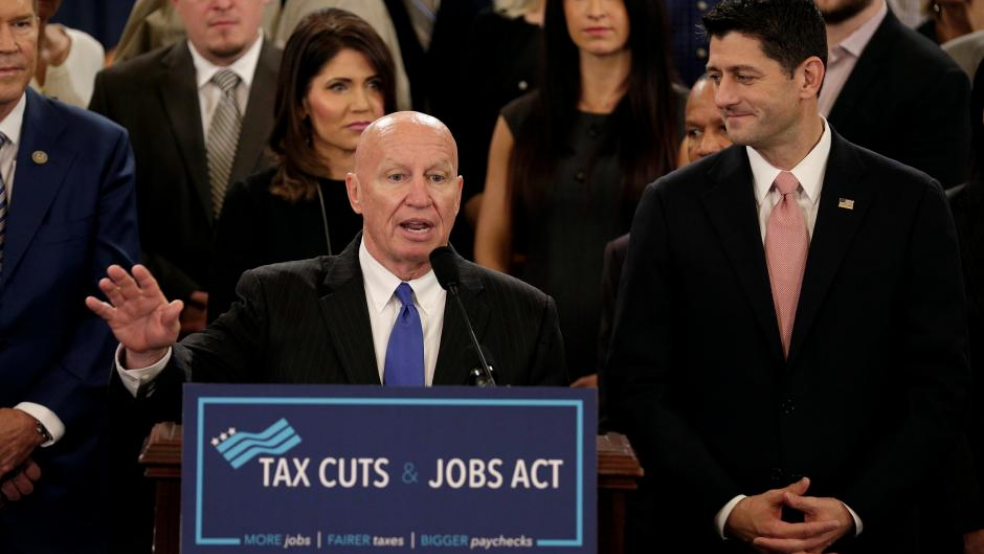The U.S. House of Representatives approved a broad package of tax cuts affecting businesses, individuals and families on Thursday, moving Republicans and President Donald Trump an important step closer to the biggest tax code overhaul in a generation.
The largely party-line 227-205 vote shifted the tax debate to the U.S. Senate, where that chamber's separate plan has already encountered resistance from some Republicans. No decisive Senate action was expected until after next week's Thanksgiving holiday.
Trump, who is looking for his first major legislative win since he took office in January, went to the U.S. Capitol just before the vote to urge Republicans to pass the tax measure, which Democrats call a give-away to the wealthy and businesses.
"Passing this bill is the single biggest thing we can do to grow the economy, to restore opportunity, to help these middle-class families that are struggling," House Speaker Paul Ryan told lawmakers before the vote.
Congress has not thoroughly overhauled the sprawling U.S. tax code since Republican Ronald Reagan was president. The House measure is not as comprehensive as Reagan's 1986 sweeping package, but it is more ambitious than anything since then.
The path forward for the tax plan in the Senate, where Republicans have a narrow majority, is fraught with political obstacles involving the federal deficit, healthcare and the distribution of tax benefits. Republicans can lose no more than two Senate votes.
Senate Republican tax writers made the risky decision to tie their plan to a repeal of the requirement for people to get healthcare insurance under former President Barack Obama's Affordable Care Act. That exposed the tax initiative to the same political forces that wrecked Republicans' anti-Obamacare push earlier this year.
The House bill, which is estimated to increase the federal deficit by nearly $1.5 trillion over 10 years, would consolidate individual and family tax brackets to four from seven and reduce the corporate tax rate from 35 percent to 20 percent.
It also would scale back or end some popular tax deductions, including one for state and local income taxes, while preserving a capped deduction for property tax payments.
Democrats have pointed to analyses showing millions of Americans could end up with a tax hike because of the elimination of popular deductions. Repealing or cutting some deductions is a way to offset the revenue lost from tax cuts.
"It's a shameful piece of legislation, and the Republicans should know better," House Democratic leader Nancy Pelosi told lawmakers before the vote.
Investors have cheered the prospect of a tax overhaul and U.S. stocks padded their gains as the House vote came to a close, with the benchmark S&P 500 index up around 1 percent on the day.
Brian Battle, director of trading at Performance Trust Capital Partners in Chicago, said stocks' strong gains on the day were helped by the House vote.
"It's helping stocks now and the bond market's turned around," he said. "The tax plan isn't a foregone conclusion but it passed the lowest hurdle in the House. The even higher hurdle is to have something pass in the Senate."
ELECTION ISSUE
Republicans have long promised tax cuts and see enacting the legislation as critical to their prospects of retaining power in Washington in the November 2018 congressional elections, particularly after their failure to meet their promise to repeal Obamacare.
But it will be a challenge in the 100-seat Senate, where Republicans can lose no more than two votes from their 52-48 majority if they hope to enact tax reform.
The Senate version has already faced criticism from several Republican lawmakers, including Senator Susan Collins, who helped sink the Republican effort to repeal Obamacare.
Republican U.S. Senator Ron Johnson said Trump called him on Wednesday night after Johnson announced his opposition to the current Senate plan because of what he said were unequal rates for small businesses and non-corporate enterprises known as "pass-throughs," versus corporations.
Still, Johnson said he was hopeful a final bill could be passed by year's end.
"I'm trying to fix it, and I want to vote yes," Johnson told CNBC, adding Trump told him he would meet with Treasury officials on the issue.
Senator John McCain, a Republican who also voted against the healthcare overhaul effort this summer, and his colleagues Bob Corker and Lisa Murkowski, are considered critical votes along with Collins and Johnson.
Nonpartisan congressional analysts say the provision to repeal the health insurance mandate in the Senate version would drive up premium costs and cause some 13 million Americans to lose coverage.
The Senate plan also sets individual tax rate cuts to expire while reductions for corporations are permanent.
The House and Senate versions will eventually have to be reconciled before they can be sent to Trump's desk for his signature.
"We'll find a middle ground and we'll get it to the president's desk ... This is a big deal for us," Republican Representative Tom Cole told MSNBC.
(Reporting by David Morgan and Amanda Becker; Additional reporting by Susan Heavey, David Alexander and Katanga Johnson in Washington; Sinead Carew in New York; Writing by John Whitesides; Editing by Alistair Bell and Frances Kerry)




